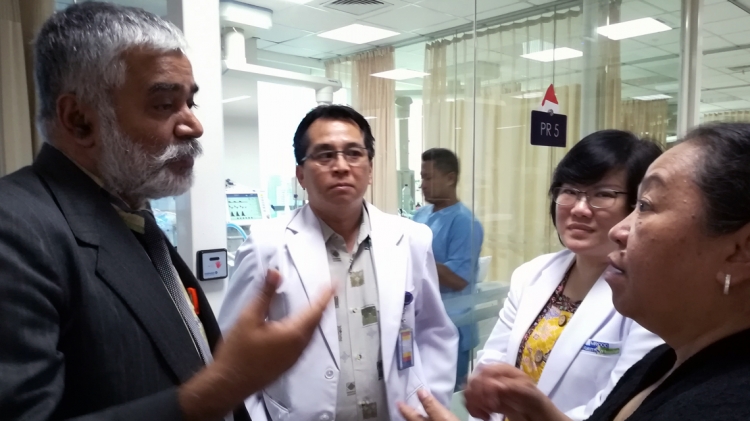Indonesia has committed to step up efforts to increase access to cancer control services across the country, and will continue to count on IAEA expertise and support, Indonesia’s Minister of Health said at a panel discussion on 2 February marking World Cancer Day.
“We have realized that the cancer control programme should be carried out comprehensively, ranging from prevention, early detection and screening, diagnosis and therapy, surveillance, research, palliative care and support and rehabilitation,” Nila Moeloek said. “We are keenly aware that in order to achieve a successful national cancer control programme, sustainable collaboration and coordination of all relevant stakeholders is imperative.”
The IAEA, through its technical cooperation programme, has been supporting Indonesia with training of oncologists and medical physicists, as well as with the sharing of best practices from other countries in radiotherapy. Indonesian experts have participated in IAEA-sponsored fellowship programmes and got hands-on experience in other countries.
An ongoing project, for instance, focuses on supporting the country in overcoming the difficulties of its scattered geography and making radiotherapy services available in locations far from the urban centres.
“Our geography is difficult. We need to do a mapping exercise to understand how services can be made more accessible to remote areas,” Ms Moeloek said, adding that “Indonesia needs to change national lifestyle behaviours and attitudes.”
Providing healthcare, including cancer care services, to the world’s fourth most populous nation of 260 million people scattered across thousands of islands can present many challenges.
According to the International Agency for Research on Cancer (IARC), almost 300 000 people developed cancer in Indonesia in 2012, the last year for which figures are available, and almost 200 000 died from cancer. These numbers are expected to rise by around two-thirds by 2030. The two most common cancers, breast and lung cancer, account for over a quarter of all cases in the country.
Impact Review for improved cancer control
A recent IAEA-World Health Organization (WHO)-IARC joint review, in the form of an imPACT Review mission, has made an assessment of the status of the country’s cancer control services and the level of access it provides as compared to the estimated needs.
The imPACT team identified significant progress in planning and implementing cancer services since a previous review in 2010. Since then, the National Cancer Control Committee developed a National Cancer Control Plan for 2015-2019 to address the country’s cancer burden. The Ministry of Health initiated breast and cervical cancer screening, the development of diagnosis and treatment guidelines, and the establishment of hospital-based palliative care teams. In 2014, they launched a national health insurance scheme to enhance access to vital cancer services. Since 2010, Indonesia has increased the number of radiotherapy facilities from 21 to 34.
They also evaluated the country’s capacity to support future planning and the expansion of its cancer control services. The main recommendations by the international experts have been:
- to develop and endorse the next national cancer control plan and ensure it is fully costed;
- to design a national development plan for nuclear medicine, including nuclear imaging, based on regional demand;
- to develop a phased national plan for gradually expanding cancer care services, especially radiotherapy, based on estimated incidence and geographic demand;
- to create multidisciplinary teams to decide treatment plans for all new cancer patients (to read more about why multidisciplinary teams are necessary, click here);
- to design a human resource development plan on education and training for cancer care, with an immediate focus on medical oncology; and
- Indonesia’s Nuclear Energy Regulatory Agency (BAPETEN) to expedite the revision of the existing regulatory framework to ensure full compliance with latest IAEA safety standards for the radiation protection of patients, staff and the general public.
“The 2015-2019 National Cancer Control Plan is in its third year of implementation and we look to the imPACT Review as an evaluation tool to assess if we are on the right track and to help us improve the overall cancer control programme,” said Soehartati Gondhowiardjo, Chair of the National Cancer Control Committee and Indonesia’s senior radiation oncologist. “Much like a tree, the Plan is the root and the imPACT Review can be seen as the fertilizer that will help branches and leaves, or output and outcomes, grow and strengthen the quality of our cancer care.”
By 2019, Indonesia plans to fully implement universal health coverage, including for cancer. Health authorities also plan to expand access to radiotherapy in the northern and eastern parts of the country.
In the short term, the IAEA is providing technical assistance to Indonesia for the domestic production of essential radioisotopes in a safe and economical manner, and ensuring continuity of supply to diagnostic facilities, as well as in national radiotherapy and nuclear medicine planning.
“As Indonesia seeks to increase radiotherapy coverage, it needs to ensure that an expanded national radiotherapy utilization plan is based on high-quality cancer data and complemented by early detection and referral systems to yield better treatment outcomes,” said Arsen Juric, Programme Officer at the IAEA’s Division for the Programme of Action for Cancer Therapy (PACT) and coordinator of the mission. “Indonesia has a broad range of cancer control stakeholders, and the reinvigorated national cancer control programme efforts represent an opportunity to broaden participation and strengthen cancer control across the country.”









